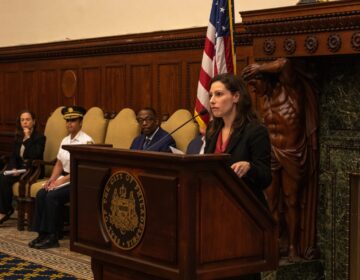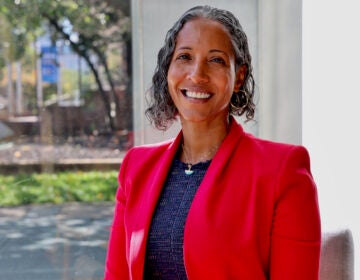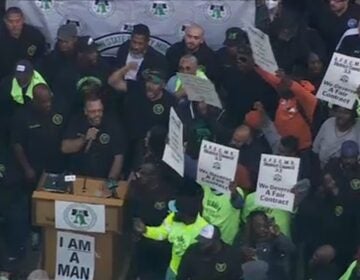Philly could get a consumer protection office inside City Hall
The proposed consumer protection office would help the city hold businesses accountable for unfair or deceptive trade practices.
Listen 1:09
Philadelphia City Hall Courtyard (Emma Lee/WHYY)
From Philly and the Pa. suburbs to South Jersey and Delaware, what would you like WHYY News to cover? Let us know!
Scam victims in Philadelphia are on track to get more help from City Hall as a sweeping consumer protection bill will likely become law in the coming weeks. There’s a small proposed budget increase to hire at least one attorney to enforce the consumer protection law.
And in the coming years, there’s a vision to create a consumer protection office.
Philadelphia City Councilmember Rue Landau, a former Community Legal Services attorney, hopes to make that a reality.
It could be built like the city’s 311 service request system.
“Handling individual complaints and getting money back into pockets of individuals quicker,” Landau said.
Far too many individuals are seeking help for that system to function at the city level. There were more than 94,400 reports of fraud in the Philadelphia metro area in 2023, according to the Federal Trade Commission.
Even community legal aid attorneys say they’ve been forced to turn away some fraud victims because the demand is too high — though they offer educational resources if they can’t represent the client.
“We turn away more clients with meritorious issues than we could possibly accept,” said Michael Froehlich, managing attorney for Community Legal Services’ homeownership and consumer rights unit. “There is a lot of fraud, a lot of consumer issues.”
When a consumer is the victim of what they think might be a scam, they’ve got at least three options: Hire a private attorney, ask for help from a government agency or seek legal aid.
It’s already against the law for businesses to deceive customers about the fine print of any product or service it’s trying to sell under Pennsylvania’s unfair trade practices and consumer protection law.
For statewide fraud cases, there’s the Pennsylvania Attorney General’s Bureau of Consumer Protection, and residents can submit complaints online. The federal Consumer Financial Protection Bureau will investigate complaints about a financial product or service.
The Philadelphia District Attorney’s Office investigates some consumer complaints under its economic crimes division, typically after individuals file a police report.
But it’s still worth it for the city to have another tool, Landau argued. “These offices are often very busy and have other pressing matters.”
Philadelphia City Council is expected to pass a consumer protection bill that empowers the city to investigate and litigate unfair and deceptive business practices. The concept was a collaboration between Cherelle Parker’s administration and Councilmember Landau, so it’s expected to be signed into law soon.
The city’s law department could levy $2,000 per violation against businesses. In addition, the city could file civil lawsuits against companies accused of scamming individuals, seek an injunction to stop the practice and then get a judgment for compensatory damages and restitution for affected customers.
The city is likely to file lawsuits in cases where a big group of customers allege fraud by the same company, akin to a class action lawsuit due to limited staff.
The consumer protection rules would have been helpful several years ago when advocates saw an influx of clients with the same issue — a mortgage was taken out against their homes without their informed consent.
At least 500 homeowners across the city were swept up in an alleged scam by real estate business MV Realty, which officials allege pressured residents to sign 40-year contracts for realtor services in exchange for several hundred dollars up-front.
Philadelphia was likely a target for that scam and continues to be for many others because there’s such a high rate of homeownership, and many who are house-rich are cash-poor, Froehlich said.
At the time, the city’s law department couldn’t file a civil lawsuit against MV Realty, so attorneys appealed for help from Pennsylvania’s attorney general, who eventually took up the case.
Now there’s a slew of lawsuits across state lines against MV Realty for deceptive trade practices. The company has since filed for chapter 11 bankruptcy protection.
Often, individual customers of a business sign away their rights to file a lawsuit in the fine print, which is what happened with the MV Realty case, said Froehlich.
“We call these forced arbitration clauses because people are forced to enter into these agreements in order to participate or purchase a product,” he said. “That really ties the hands of private attorneys who want to represent consumers.”
But that forced arbitration clause doesn’t apply to government regulators, which is how state and federal agencies can file civil lawsuits against companies on behalf of the public.
Tackling consumer fraud isn’t easy, especially for senior citizens who may not be very familiar with how easily public information can be used to mislead them.
For example, there’s a scam where a senior citizen’s home is in foreclosure, which is a public record. The business can glean how much money is owed to pressure the homeowner into making payments to stop a fictitious sheriff’s sale.
“There’re many companies that basically scour these [foreclosure] dockets, and then it’s very easy to imitate the bank,” said Susan Nolen, staff attorney in the homeownership rights unit at the SeniorLAW Center in Philadelphia.
“They can get them to pay a few thousand dollars to stop the sale, but it didn’t exist.”
Nolen said that many scam victims rely on the Pennsylvania Victims Compensation Assistance Program because the businesses are difficult to track down to recoup money.
Councilmember Landau said she sees the consumer protection bill as a way to combat poverty.
“Low-income people are often one scam away from falling back into poverty or losing their home, their car, or having some sort of massive disruption in their lives,” she said. “What I hope someday will happen is that we will get a consumer protection office in Philadelphia, so similar to New York City, [Philadelphia] will be able to handle individual complaints. I’m not finished. I think I’ve just started.”

Get daily updates from WHYY News!
WHYY is your source for fact-based, in-depth journalism and information. As a nonprofit organization, we rely on financial support from readers like you. Please give today.







